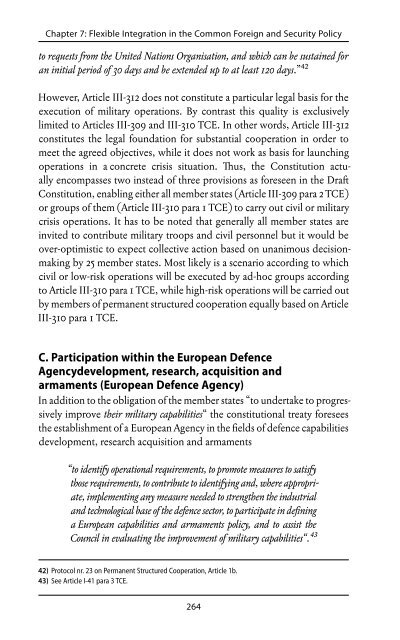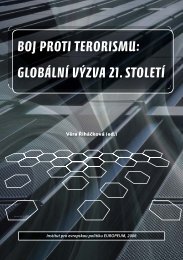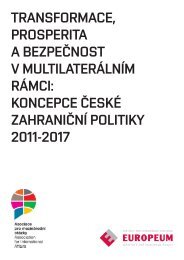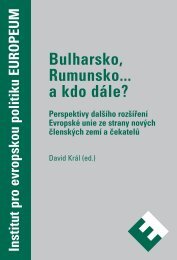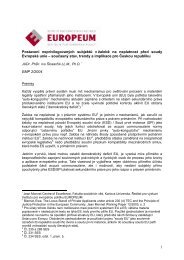eu constitutionalisation - EUROPEUM Institute for European Policy
eu constitutionalisation - EUROPEUM Institute for European Policy
eu constitutionalisation - EUROPEUM Institute for European Policy
Create successful ePaper yourself
Turn your PDF publications into a flip-book with our unique Google optimized e-Paper software.
Chapter 7: Flexible Integration in the Common Foreign and Security <strong>Policy</strong>to requests from the United Nations Organisation, and which can be sustained <strong>for</strong>an initial period of 30 days and be extended up to at least 120 days.”⁴²However, Article III-312 does not constitute a particular legal basis <strong>for</strong> theexecution of military operations. By contrast this quality is exclusivelylimited to Articles III-309 and III-310 TCE. In other words, Article III-312constitutes the legal foundation <strong>for</strong> substantial cooperation in order tomeet the agreed objectives, while it does not work as basis <strong>for</strong> launchingoperations in a concrete crisis situation. Thus, the Constitution actuallyencompasses two instead of three provisions as <strong>for</strong>eseen in the DraftConstitution, enabling either all member states (Article III-309 para 2 TCE)or groups of them (Article III-310 para 1 TCE) to carry out civil or militarycrisis operations. It has to be noted that generally all member states areinvited to contribute military troops and civil personnel but it would beover-optimistic to expect collective action based on unanimous decisionmakingby 25 member states. Most likely is a scenario according to whichcivil or low-risk operations will be executed by ad-hoc groups accordingto Article III-310 para 1 TCE, while high-risk operations will be carried outby members of permanent structured cooperation equally based on ArticleIII-310 para 1 TCE.C. Participation within the <strong>European</strong> DefenceAgencydevelopment, research, acquisition andarmaments (<strong>European</strong> Defence Agency)In addition to the obligation of the member states “to undertake to progressivelyimprove their military capabilities“ the constitutional treaty <strong>for</strong>eseesthe establishment of a <strong>European</strong> Agency in the fields of defence capabilitiesdevelopment, research acquisition and armaments“to identify operational requirements, to promote measures to satisfythose requirements, to contribute to identifying and, where appropriate,implementing any measure needed to strengthen the industrialand technological base of the defence sector, to participate in defininga <strong>European</strong> capabilities and armaments policy, and to assist theCouncil in evaluating the improvement of military capabilities“.⁴³42) Protocol nr. 23 on Permanent Structured Cooperation, Article 1b.43) See Article I-41 para 3 TCE.264Chapter 7: Flexible Integration in the Common Foreign and Security <strong>Policy</strong>A more detailed catalogue of its functions is contained in Article III-311 para1 TCE. Effective participation in the agency remains facultative and doesnot affect membership in other <strong>for</strong>ms of flexible integration in the field ofarmament cooperation. In this respect the final report of the Conventionworking group on “Defence” suggested,44 that the agency should “incorporate,with a <strong>European</strong> label, closer <strong>for</strong>ms of cooperation which already exist inthe armaments field between certain member states (OCCAR, LoI). The Agencyshould also be tasked with strengthening the industrial and technological base of thedefence sector. It should also incorporate the appropriate elements of the cooperationthat most member states undertake within the WEAG.”⁴⁵The incorporation of existing initiatives in the field of armament into thecontext of EU policies, accentuate the need <strong>for</strong> modalities allowing <strong>for</strong> theparticipation of third States and the willingness of the member states, tosubstitute national regulatory frameworks and preferential economic relationsby a common approach in this field. This particularly true given thefact that only a small number of them have significant defence industrialsectors. In other words, most member states are consumers rather thanproducers of defence equipment. However most details on the participation,the role of the Commission or on procedural aspects regarding theincorporation of OCCAR, WEAG/WEAO and LoI are not exhaustivelydealt with in thetreaty text.By contrast, the objectives of the agency are well-defined, encompassingthe fields of procurement, research and the establishment of a commondefence market. However, the exclusion in primary law of the applicationof competition rules in the defence sector is in direct opposition to theenvisaged profile of the <strong>European</strong> Defence Agency.⁴⁶ The unconditionaltransfer of Article 296 TCE into the framework of the text (Article III-436TCE) despite of prominent voices opposing it, may raise concerns onthe seriousness of the Agency project. In return, due to the voluntarynature of participation in the Agency, any full application of the competitionrules on the defence sector would not be acceptable. It would bemore realistic to adapt the relevant provision accordingly or to agree on44) See CONV 451/02, para 64.45) WEAG – group <strong>for</strong> armaments cooperation between 19 <strong>European</strong> countries (14 of which are membersof the <strong>European</strong> Union and 16 members of NATO), the objective being harmonisation of operationalprogrammes and standards, cooperation on research and technology and the opening up of contracts.46) See Article 296 para 1 TEC.265


